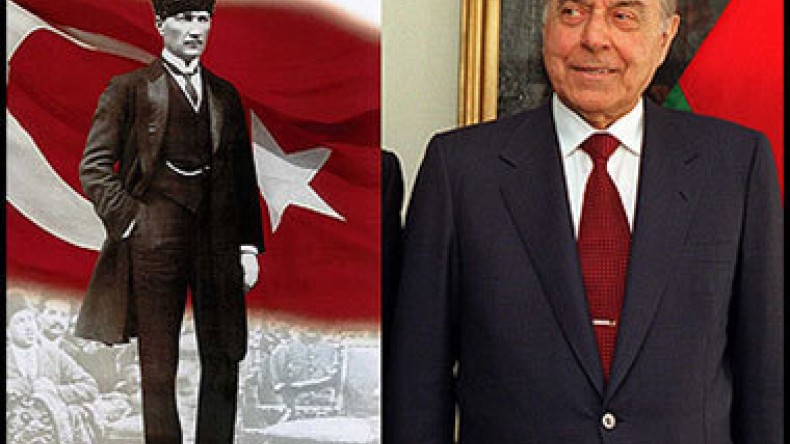
Turgut Er: Heydar Aliyev regime humiliated and racketeered Turkish investors in Azerbaijan
Heydar Aliyev laughed with the Russians, while to the Turkish visitors, he was cold and sometimes even threatening, keeping his distance, writes the Turkish diplomat Turgut Er, who served press attaché for the Turkish embassy in Azerbaijan during Heydar Aliyev’s rule, in his book “From Freedom to Tyranny.”
Heydar Aliyev’s regime of tyranny targeted the “poor Turkish entrepreneurs” who worked in Azerbaijan. They were not able to stand the Aliyev regime’s humiliations, bribery and groundless checks, according to Er.
The Turkish entrepreneurs, who employed over 40 thousand Azerbaijanis, were not allowed to invest more than 3 billion dollars. Since 1997, the factories started to be taken away from the owners.
According to Er, Heydar Aliyev revived the Soviet system and its traditions. Under the guise of “checks,” accusations were brought against the entrepreneurs, in accord with the laws of the communist system. They were forced to sell their business for five gapiks (1/100 of Azerbaijani manat), or else, “rot” in the basements of KGB. “The people abandoned their fortune and returned to Turkey to get back on their feet,” this is how the author describes the state of affairs in Azerbaijan in those times.
Remarkably, even the Turkish Embassy was not able to do something about it, because Heydar Aliyev stood in front of the embassy staff backed by Suleyman Demirel. “The relations between the two countries were not intergovernmental but rather interpersonal,” the former diplomat writes.
According to Er, the only person before whom the executive power was accountable, was Aliyev. Once a year their gathered in the Lenin Palace or in the building of the Central Committee of the Communist Party of the Soviet Union to “render an account” in meetings, which foreigners called “comedy.” The reports had the following content: electricity, water and fuel needs satisfied; abundance of grain, meat, bread, vegetables, fruit, butter and cheese; employees’ salaries paid in time; roads constructed, municipal services provided, companies operated. They wanted Heydar Aliyev to speak at those meetings and make fake “signals” to confirm what they said, which would serve a proof for them that the aforementioned executive power provided the services for the people and the country.
“The people talked about how many million dollars’ bribe one was to pay to those in power in order to get a position,” Er writes. He highlights that the rumors and talks applied to the police chiefs, investigators, judges, chief physicians, university rectors, department heads, factory directors and ministers.
Referring to the collapse of the communist system, Er writes that Azerbaijan faced plenty of social, economic and political problems, the people were indifferent to everything, and the relations between them and the government was based on fear, bribery and lawlessness. “The road to Heydar bey’s residence was closed for three or four hours. In summer and winter, soldiers of the Internal Troops and police officers stood on both sides of the road. This sight made me boil up from the inside,” Er recalls.
When Heydar Aliyev went to his dacha in Zagulba – 23-30 km from Baku – police officers and soldiers stood on all his way long. Both in the winter cold and in hot summers, those people stood for four or five hours waiting for Heydar Aliyev’s motorcade to pass – a deplorable sight for the author and other foreign observers. Once the author asked his driver, “Why are these people being tormented all day long? They have good helicopters they can use. This would save their time and those people would not suffer so much.” The driver laughed at that and said, “Sir, the old system was just the same – from the one hand, Heydar Aliyev loudly heartened the people, and created an atmosphere of fear from the other. The people know – Aliyev is the same Aliyev and the regime is the same regime.”
To be continued.
After the publication of the book “From Freedom to Tyranny: As if Stalin and Beria revived,” the authorities in Azerbaijan accused Er of libel and anti-Azerbaijani activities as he unmasks Heydar Aliyev’s two-faced government and proves that Aliyev’s actions were often conditioned by personal interests rather than the benefit of the state and people. In response, Turgut Er said that everything he wrote in the book is based on well-known and published documents, and the accusations of libel are yet another proof of the Azerbaijani authorities’ stupidity and meanness.
Related:
Turgut Er: Heydar Aliyev is known worldwide as atheist, communist and KGB general
Turgut Er: It was Ramiz Mehdiyev who Azerbaijanis feared and despised more than Heydar Aliyev
Newsfeed
Videos






























